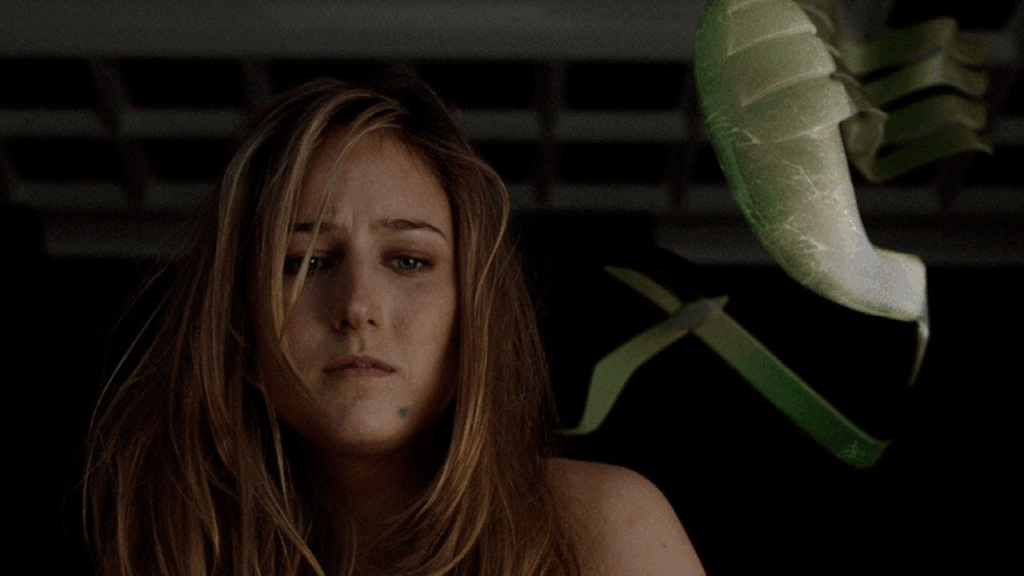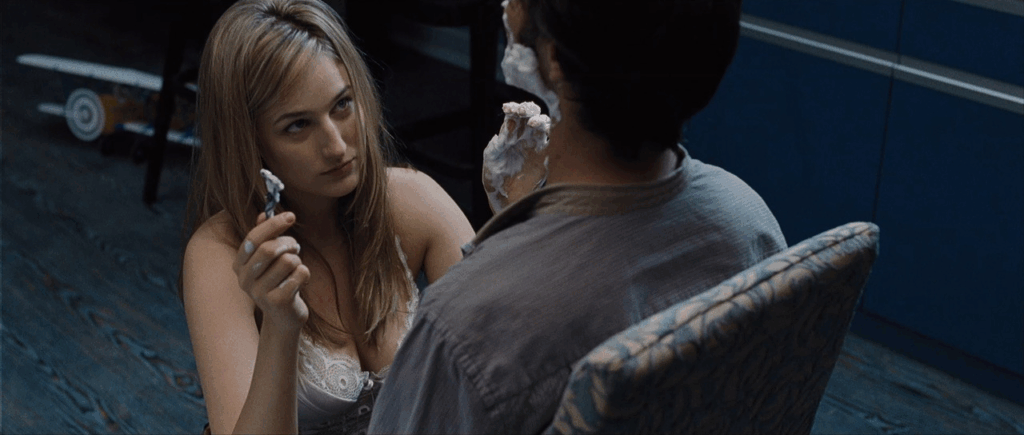Branded (2012)

Introducing Branded (2012) – A Comprehensive Overview
A Dystopian Satire on Consumerism and Control
Branded (2012), written and directed by Jamie Bradshaw and Alexander Doulerain in their feature debut, is a Russian-American science fiction thriller that blends dystopian allegory, psychological drama, and surreal visuals to critique consumer culture. Starring Ed Stoppard, Leelee Sobieski, Jeffrey Tambor, and Max von Sydow, the film follows a marketing executive who gains the ability to see the manipulative forces behind advertising, leading to a battle against corporate control. Released on September 7, 2012, in Russia and the United States, Branded is a bold but polarizing experiment, praised for its ambitious ideas but criticized for its convoluted execution. Set in a futuristic Moscow, it tackles themes of consumerism, free will, and societal manipulation, making it a unique, if flawed, entry in the sci-fi genre. This article provides a comprehensive exploration of the film’s narrative, cast, production, themes, reception, and cultural significance, offering a complete introduction to its complex legacy.

Synopsis: A Visionary’s Fight Against Corporate Monsters
Branded is set in a dystopian future where global corporations dominate society through pervasive marketing. The story follows Misha Galkin (Ed Stoppard), a Russian marketing genius who, as a child in 1980s Moscow, is struck by lightning during a Soviet ritual, granting him a mysterious connection to the stars. As an adult, Misha rises in the advertising world, working for a powerful agency under his mentor, Bob Gibbons (Jeffrey Tambor). He falls in love with Abby (Leelee Sobieski), an American producer, and together they pitch a reality TV show, Extreme Cosmetic Surgery, to promote fast food chains, reflecting the era’s obsession with ***.
Misha’s life unravels when a marketing campaign fails, leading to a public backlash and his retreat to rural Russia. There, a surreal encounter with a red cow sacrifice—echoing his childhood ritual—unlocks his ability to see “brands” as monstrous, parasitic creatures attached to people, manipulating their desires. These entities, visualized as grotesque CGI beasts, represent corporate control, feeding on human consumption. Misha returns to Moscow, determined to dismantle the brand monsters, starting with a fast-food chain, The Burger, by launching a campaign to make “fat” fashionable, reversing consumer trends. His actions spark chaos, threatening the global economy and drawing the ire of a shadowy marketing syndicate led by a guru (Max von Sydow).

As Misha’s crusade intensifies, he faces betrayal from Abby, who is swayed by corporate interests, and resistance from Bob, whose loyalty to the system wavers. The narrative blends psychological horror, with Misha’s visions of brand creatures, and action, as he battles corporate enforcers. The climax sees Misha confronting the syndicate’s leader, risking his sanity to free society from brand control, though the ambiguous ending questions whether true liberation is possible. Running at 106 minutes, Branded is a visually striking, narratively dense satire that challenges viewers to decode its allegorical layers, anchored by its ambitious premise.
Ed Stoppard and Leelee Sobieski: A Mixed but Committed Cast
The performances in Branded are uneven but earnest, with Ed Stoppard leading as Misha Galkin. Stoppard, known for Nanny McPhee (2005), brings a brooding intensity to Misha, portraying him as a visionary torn between ambition and rebellion. His wide-eyed wonder in visionary scenes and steely resolve in action sequences convey Misha’s transformation, though critics like The Hollywood Reporter noted his “stiff” delivery occasionally hampers emotional depth. Stoppard’s commitment to the role, including learning Russian for authenticity, as mentioned in a 2012 Variety interview, adds credibility, but the script’s complexity sometimes overshadows his performance.
Leelee Sobieski, as Abby, delivers a grounded but underutilized performance. Known for The Glass House (2001), Sobieski infuses Abby with charm and vulnerability, particularly in romantic scenes with Stoppard, but her character’s shift to corporate allegiance feels abrupt, as Slant Magazine critiques, limiting her arc. Jeffrey Tambor, as Bob, brings wry humor and gravitas, his conflicted loyalty stealing scenes, with Roger Ebert praising his “reliably sardonic” presence. Max von Sydow, in a brief but commanding role as the marketing guru, exudes menacing authority, his gravitas elevating the film’s stakes, per The New York Times.

Supporting roles, including Ingeborga Dapkunaite as a syndicate operative and Andrey Smolyakov as Misha’s uncle, add texture to the dystopian Moscow, though minor characters often feel like plot devices, as Letterboxd users note. The cast’s interplay, particularly in tense boardroom scenes, drives the film’s satirical edge, but Stoppard and Sobieski’s uneven chemistry, described by IMDb reviews as “lacking spark,” reflects the script’s narrative challenges.
Production: A Visually Bold but Chaotic Experiment
Written and directed by Jamie Bradshaw and Alexander Doulerain, Branded was produced by Roadside Attractions, Mirumir, and Bomar OOD with a $20 million budget, largely funded by Russian investors, per Box Office Mojo. Shot in 2010 in Moscow and Sofia, Bulgaria, the film captures Moscow’s blend of Soviet-era architecture and modern consumerism, with CGI-heavy sequences depicting brand monsters. Cinematographer Rogier Stoffers used a vibrant, neon-lit palette for urban scenes and stark, dreamlike visuals for Misha’s visions, creating a surreal aesthetic, as praised by Film Threat for its “psychedelic flair.”
The score by Eduard Artemiev, blending electronic and orchestral elements, amplifies the film’s dystopian tone, though some Variety critics found it “overwrought.” Visual effects by Prime Focus, including the CGI brand creatures, were ambitious but divisive, with The Guardian calling them “grotesque but cheap-looking.” Production design by Yuri Mateychik, with futuristic billboards and retro Soviet props, immersed viewers in a consumerist dystopia, per AllMovie. The film’s non-linear structure, with flashbacks to Misha’s childhood and surreal interludes, challenged conventional storytelling, a choice Bradshaw defended in a 2012 IndieWire interview as “mirroring the chaos of advertising.”
Challenges included securing U.S. distribution due to the film’s unconventional narrative and Russian financing, which limited marketing, as Box Office Mojo notes. The film’s R rating, for “language and some sexual content,” reflected its mature themes, per Common Sense Media. Originally titled Moscow 2017, it was renamed Branded to emphasize its marketing critique, per IMDb. Premiering at the 2012 Toronto International Film Festival, it faced mixed buzz but secured a limited U.S. release through Roadside Attractions.

Themes and Symbolism: Consumerism, Free Will, and Manipulation
Branded is a scathing satire of consumerism, exploring how corporations manipulate desires to control society. Misha’s ability to see brand monsters literalizes advertising’s parasitic nature, feeding on human insecurities, as analyzed in Film Quarterly. The film critiques globalization, with fast-food chains and reality TV symbolizing cultural homogenization, a theme resonant with 2012’s post-recession distrust of corporate power, per The Atlantic. Free will versus determinism is central, with Misha’s crusade questioning whether individuals can resist systemic control, though the ambiguous ending, as Letterboxd users note, suggests partial liberation at best.
The film also probes personal ambition, with Misha’s initial embrace of marketing reflecting complicity, mirrored by Abby’s betrayal, per Slant Magazine. Gender dynamics are subtle, with Abby’s shift from ally to corporate pawn critiquing female commodification in media, though underdeveloped, as The Guardian observes. Symbolically, the brand monsters—tentacled, oozing creatures—represent capitalism’s grotesque excess, while the red cow sacrifice evokes ancient rituals corrupted by modern greed, per Film Threat. Moscow’s skyline, blending Soviet relics with neon ads, symbolizes a society caught between ideologies, as Variety notes. The film’s ***, like Misha’s star-guided visions, suggest a cosmic battle for humanity’s soul, aligning with its allegorical ambition.

Reception and Controversy: A Polarizing Vision
Branded received largely negative reviews, earning a 14% approval rating on Rotten Tomatoes from 28 critics and a 28/100 on Metacritic from 10, reflecting “generally unfavorable” reception. The New York Times’ Manohla Dargis called it “a mess of bold ideas and shoddy execution,” praising its ambition but decrying its “incoherent” plot. Roger Ebert gave it one star, labeling it “a muddled, ambitious sci-fi allegory” with “unconvincing” effects, though noting Tambor’s “dependable” performance. The Hollywood Reporter criticized its “confused narrative” but lauded its “visual audacity,” while Film Threat gave three stars, appreciating its “courageous swing” despite “clunky” dialogue. Slant Magazine’s Chuck Bowen rated it 1.5/4, calling it “intriguing but maddeningly obtuse.”
Audience reactions were equally divided, with a 27% Popcornmeter on Rotten Tomatoes from over 1,000 ratings. Fans on Letterboxd, like @SciFiNut, praised its “wild anti-corporate satire,” while others, like @MovieSkeptic, called it “a chaotic mess” with “no clear point.” X posts from 2012, like @FilmBuzz12, reflect initial curiosity, with some calling it “weirdly fascinating” but “hard to follow.” The film grossed $353,513 domestically and $3.7 million worldwide, a flop against its $20 million budget, per Box Office Mojo, due to limited release and poor marketing.
Controversy centered on its narrative incoherence and perceived anti-capitalist stance, with some, like The Guardian, arguing it “demonized” marketing without offering solutions. The CGI brand monsters divided viewers, with IMDb reviews calling them “laughably bad” or “disturbingly effective.” The film’s Russian financing raised eyebrows, with Variety speculating it reflected post-Soviet anxieties about Western consumerism, though Bradshaw and Doulerain denied political agendas, per IndieWire.

Cultural Significance: A Flawed but Ambitious Satire
Branded emerged during a 2010s wave of dystopian sci-fi, alongside In Time (2011) and Divergent (2014), reflecting post-recession skepticism of corporate power and globalization. Released in 2012, amid debates about advertising’s psychological impact and the rise of reality TV, its critique of consumer manipulation was timely, as The Atlantic notes. The Moscow setting, blending Soviet nostalgia with modern excess, tapped into Russia’s cultural transition, resonating with global audiences wary of unchecked capitalism, per Film Quarterly.
Compared to The Reader (2008), previously discussed, which explores historical guilt through intimate drama, Branded uses sci-fi satire to probe societal control, both featuring protagonists (Misha, Michael) confronting systemic issues but differing in tone and execution. Stoppard’s performance, though uneven, showcased his range, while Sobieski’s role, her last major film before retiring, marked a career pivot, per IMDb. Tambor and von Sydow’s involvement lent credibility, with von Sydow’s cameo echoing his sci-fi gravitas in Minority Report (2002).
Branded’s influence is niche but evident in later anti-corporate satires like The Circle (2017), and its cult status, fueled by Blu-ray releases and streaming on Tubi, endures, with 2025 X posts like @vibe_trib3 calling it “a flawed but fascinating head-trip.” Academic analyses in Journal of Consumer Culture explore its marketing critique, while Letterboxd fans debate its “bonkers” ambition.

Legacy and Availability
Branded remains a divisive cult curiosity, celebrated for its bold anti-consumerist satire and *** but critiqued for its narrative chaos and uneven execution. Its 2013 Blu-ray and DVD releases by Lionsgate, including director commentary, are collector items, per Amazon. Academic discussions highlight its place in dystopian cinema, while Letterboxd reviews, like @CultFan’s “messy but unforgettable,” affirm its niche appeal.
As of May 22, 2025, Branded is available for streaming on Tubi, Peacock, Kanopy, and Prime Video (subject to regional availability), with English subtitles. Rental and purchase options exist on Amazon Video, Apple TV, Fandango at Home, YouTube, and Google Play. Physical copies are available through retailers like Amazon and Walmart.

Conclusion: A Bold, Flawed Sci-Fi Satire
Branded (2012) is an ambitious, chaotic sci-fi thriller that dares to critique consumer culture through a surreal lens. Jamie Bradshaw and Alexander Doulerain’s direction, paired with Ed Stoppard’s earnest lead and a striking visual style, crafts a film that provokes more than it coheres. While its convoluted plot and uneven performances divide viewers, its fearless ideas and cult appeal make it a unique artifact of 2010s dystopian cinema, rewarding those who embrace its wild vision.
For fans of sci-fi, anti-corporate satire, or bold cinematic experiments, Branded offers a strange, thought-provoking journey—one that unveils the monsters behind the ads and challenges the cost of ***.
